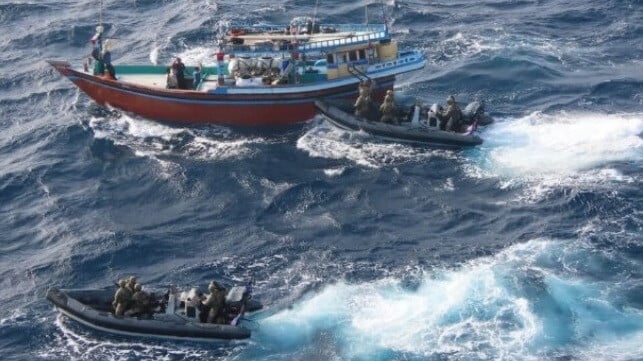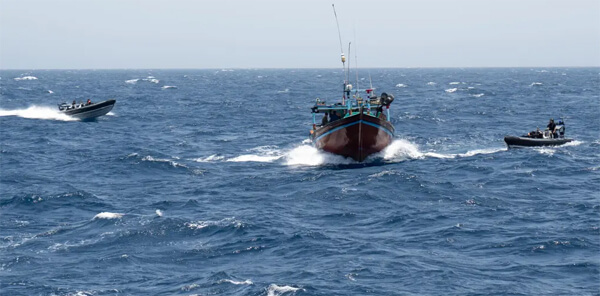Task Force Makes Another Drug Burst in the Arabian Sea Aided by Drones

The international effort to maintain security in the Arabian Sea is reporting another significant drug seizure again aided using new technology. Last week, the UK Royal Navy frigate HMS Lancaster, which was part of a CTF 150 routine patrol in the North Arabian Sea, identified a suspicious small cargo dhow transiting the area.
The British frigate reports it secretly shadowed the suspect through the Arabian Sea for more than 24 hours. As part of the operation, it deployed for the second time the Royal Navy’s new Peregrine drones. The command of the Lancaster describes them as “mini helicopters which conduct reconnaissance stories for hours and feed live information to the vessel’s operation room." The same vessel highlighted in March that it had used the system for the first time during a drug seizure.
After further monitoring of the dhow using a drone, the Royal Marines went into action. A boarding team of 42 commandos was embarked into two sea boats and in what the command called “a pincer movement,” the dhow was interested. Overhead, Royal Marine snipers were monitoring the operation from the frigate’s Wildcat helicopter.

“This is another example of where Lancaster has delivered at range, in isolation, utilizing her own organic assets,” reported Commanding Officer Commander Chris Chew. “Whether they come in the form of her Wildcat, our uncrewed air system Peregrine, embarked intelligence team, or her Royal Marine Boarding Team, they delivered on operations in support of the Combined Maritime Forces and New Zealand-led Combined Task Force 150.”
Searching the suspect vessel, the team found 50 packages containing one ton of heroin, 55 packages containing 660kg of hashish, and 6 kg of amphetamine tablets. The drugs are estimated to have a street value of over $36 million.
“This is the largest value in narcotics interdiction we have made under our New Zealand command this year,” said Royal New Zealand Commodore, Rodger Ward, who is also the Commander of CTF 150. New Zealand took over the command of CTF 150 from the Pakistan Navy in January as part of the rotating command.
While it was the second time in two months that Lancaster has interdicted high-value drug trafficking in the Arabian Sea, last week was far larger than the previous one. In March, the frigate seized heroin and amphetamine valued at more than $6 million from a dhow.

that matters most
Get the latest maritime news delivered to your inbox daily.
CTF 150 was established in 2002 as one of the five operational task forces under the Combined Maritime Forces (CMF). The CMF operation is reported to be the world’s largest international maritime partnership. It involves 46 nations.
Since July 2024, ships working in support of CTF 150 have carried out at least five successful interdictions against cases of drug smuggling in the Arabian Sea. In the recent past, the waters of the Arabian Peninsula have become synonymous with drug trafficking, with CTF 150 confiscating over $1 billion worth of illicit narcotics since 2021.
